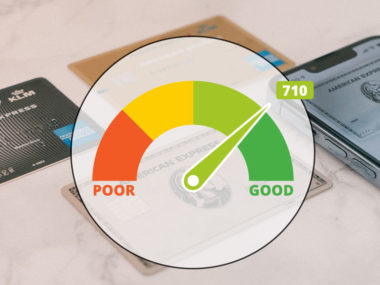If you have a credit score of 705, Experian classifies it in the “Good” range, which is 670 to 739. Although you could still improve your score, it’s still higher than about 35% of other consumers, and won’t keep you from accessing credit when you need it.
To determine what’s affecting your credit score, and what you can do to improve it, you can request a free credit report and score from the credit bureaus.
By understanding what goes into your score, and managing your credit appropriately, you can earn more points and qualify for lower interest rates, more attractive credit card incentives, and additional credit.
Table of Contents
Why Your Credit Score Is 705
Although we cannot say the exact things that determine your score, everyone’s score is calculated using the same mix of factors.
These include your payment history, credit utilization (how much you owe on your existing accounts), the length of your credit history, the type of credit you have, and how many recent applications for credit you’ve made.
The factors are weighted, with your payment history and amount owed comprising the biggest portion of the score at 35% and 30% of the total score respectively.
Given the way credit scores are calculated, you can assume that your score is 705 because:
You Have a Solid Payment History
Your payment history is the single biggest influence on your score. Missing payments and becoming delinquent on your accounts have a significant impact on your score, dropping it by as much as 50 points, but a good score shows that you pay your bills on time as agreed.
You might have some old collection accounts, or have been late on payments in the past, but they are most likely not affecting your score at this point.
Amount You Owe
Your existing balances account for 30% of your credit score. Although it’s not a red flag to lenders if you owe money on your accounts, especially installment accounts like a mortgage and you’re paying as agreed, it is a concern if your balance is high in proportion to your available credit.
In other words, “maxing out” your cards and carrying balances close to the limit will reduce your score; in some cases, your score can start dropping when you use just 5% of your available credit.
A 705 credit score could indicate that you are carrying high balances on your cards that should be paid down.
Length of Credit History
The credit bureaus reward a long credit history with extra points, especially if you have been responsible for your credit usage. Some people with fairly new credit histories have lower scores simply because their accounts aren’t old enough yet.
The length of your credit history is 15% of your credit score, and it’s influenced by everything from the length of your oldest account to how long it’s been since you used an account. Keeping your accounts in good standing will increase your score as time goes on.
Credit Mix
Your credit mix, or the different types of accounts you have, has a minimal effect on your credit score. It only accounts for up to 10% of the overall score.
While having a mix of credit cards and loans can give you a few extra points, you don’t have to have all types of credit. To maintain or increase your 705 score, continue being responsible with the credit you have.
Credit Inquiries
Any time you apply for new credit, the hard inquiry can temporarily take a few points off your score. Inquiries don’t stay on your credit report as long as other information, so you can get those points back quickly, but when you are trying to maintain or increase a good credit score, limit how many accounts you apply for.
What Can You Do With a 705 Credit Score?
A credit score of 705 is within the average range for most U.S. consumers, and considered acceptable by the majority of lenders.
This means you’ll typically qualify for most types of credit, including credit cards, mortgages, and auto loans, provided you meet the lender’s additional criteria, including minimum income level, employment history, and down payment amount.
That said, because 705 is only considered a good score, and not Very Good or Excellent, it’s likely you’ll have to pay higher interest rates than the most qualified customers.
Other things you can expect with a 705 credit score include:
- Approval for most credit cards, including store cards, most rewards cards, and some 0% introductory interest cards.
- You may not get the most favorable interest rate or highest limits, which can affect your rewards earning potential.
- You may have limited access to the most generous sign-on bonuses, as well.
- Approval for a home mortgage.
- Your credit score isn’t the only factor in determining mortgage approval, but a 705 score will help you get approved, albeit at a higher interest rate than a borrower with a higher score.
- Depending on your down payment, the lender may also require you to purchase private mortgage insurance (PMI).
- Approval for an auto loan.
- You may qualify for a 0% interest auto loan, depending on your income, down payment, and history with the lender. Otherwise, you will qualify for other financing programs.
- Approval for rentals.
- A 705 credit score should help you qualify for an apartment or home rental without difficulty, provided you meet the landlord’s other criteria.
Although a 705 credit score is close to a very good score, it can affect a few aspects of your financial life. You won’t qualify for the most favorable auto and home or renter’s insurance rates. It’s also possible that your applications for the most generous rewards credit cards, including hotel or airline credit cards, will be rejected.
How to Improve a 705 Credit Score
Although a credit score of 705 is good, you can still take steps to improve it, and even achieve an excellent score. It may take time, but some ways to earn extra points include:
- Continue making on-time payments.
- Pay down the balances on your existing accounts. The more you pay each month, the better. Aim to pay your balance in full every month.
- Avoid closing old or unused accounts. Older accounts help lengthen your credit history, adding points to your score.
- Consider requesting credit increases on your existing accounts. Higher limits help reduce utilization, which drives up your score.
- Review your credit report for incorrect or outdated information. If you have old collection accounts, for example, request to have them removed from your report.
- Limit applications for new credit.
Raising your credit score from Good to Very Good or Exceptional can take time, but it is possible. Continuing your responsible credit behavior and paying back what you owe will go a long way toward getting you toward that goal.
Image Source: https://depositphotos.com/





